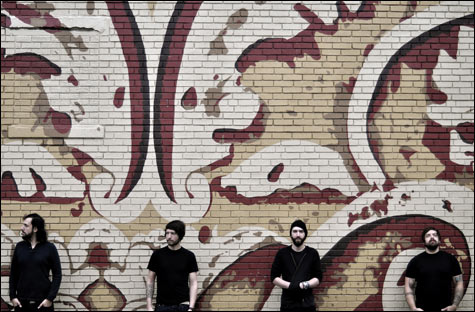
PARTS AND LABOR: Over the past four years, Junius have pieced together their big, stargazing sound from elements of metal and post-rock and even bits of moody new wave. |
It never seemed possible, but metal is finally getting comfortable with indie-rock proportions. What once required enormous stages with catwalks and hyperactive spark machines now really needs only kids throwing all-ages shows in basements. It's a bit more modest an existence — nobler, somehow. Nerdier, even.
Case in point: the new album from Boston touring machines Junius, The Martyrdom of a Catastrophist (The Mylene Sheath), focuses on an obscure figure with whom many of their peers could probably identify, the Russian-Jewish scholar Immanuel Velikovsky. Relegated to the used bin of pseudo-science, Velikovsky labored through life without ever garnering much respect. He made a few notable predictions about planets' electromagnetic fields and attempted to rewrite a large portion of Earth's history, pinpointing catastrophes like the Flood by matching up the mythologies of Hebrew, Greek, and Indian cultures. He also had some famous friends, like Einstein.
Velikovsky would make a fine focus for a big, sprawling, concept album from any kind of band, but especially so from Junius, whose balance of metal volume and chamber delicacy could easily veer toward stone-faced seriousness. Musing over the lovable failure that was Velikovsky makes the whole thing a bit homier, a little more humble.
"His life was both inspiring and heartbreaking," says guitarist Michael Repasch-Nieves from a stop on the band's UK tour. "We found a lot of parallels between his struggle within the academic world and our own struggles as musicians."
So, rather than the righteous self-alignment that, say, Mastodon made a few years ago with Moby-Dick on their concept album Leviathan, we get a band more into the possibility that it might be all for naught. Martyrdom of a Catastrophist suggests that the rock world is littered with uncertified technicians throwing together whatever pieces of the puzzle they can find to make it work — and maybe that's what's beautiful about it.
Over the past four years, Junius (who play the Middle East upstairs this Friday) have pieced together their big, stargazing sound from elements of metal and post-rock and even bits of moody new wave. They're nomad alchemists of sorts (most of their music is developed on the road), turning slabs of slow-moving riffage into what could almost pass as pop. There are widescreen deluges of distortion and reverb under slow chugging drums; there are also bell-clear guitars that gather in the shadows and ring through stately minor chords. Album opener "Birth Rights by Tonight" rides a thinly veiled take on Diana Ross's melody in "You Keep Me Hangin' On," with Junius crooner Joseph E. Martinez bringing it down into his vaguely British echoplex baritone and conjuring a bit of Human League in the process.
"It's tough, because people aren't sure where to put us," says Repasch-Nieves. "We have vocals, so we're not post-rock, we're too melodic to be metal, too loud and heavy to be pop."